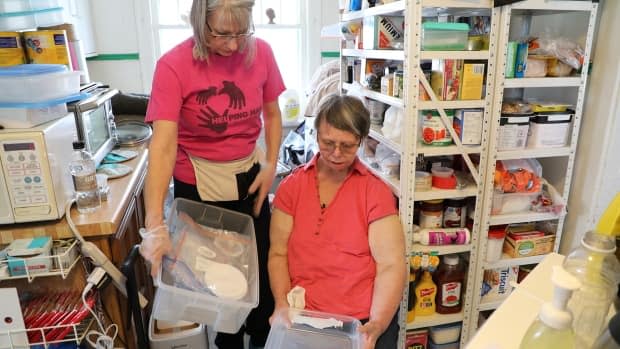Edmonton filmmaker unpacks the possessions that define our lives
In 2011, a police officer banged on the door of Lesa Marshall's apartment. There was a fire in her downtown Edmonton building, and the officer said she needed to get out immediately, so she fled with just a purse and jacket.
The fire did not destroy her apartment, but smoke and water damaged her belongings.
She moved to another place, but disaster soon struck again: a pipe burst in the floor above, flooding her space, destroying more stuff.
Seven years later, in yet another apartment, someone in her building threw a cigarette butt into a planter, starting a fire.
In the three calamities combined, Marshall lost almost everything she owned, including art, travel souvenirs, family photos, a collection of concert T-shirts and mementoes from her late sister.
The material and psychological costs of those losses feature in Attachments of Life, Brandy Yanchyk's new documentary about how belongings — collecting them, losing them and trying to let go of them — change people's lives.
The film also follows an antique car collector in Leduc, a minimalist couple living in a tiny house in Cochrane and a woman with hoarding disorder in Edmonton.
Watch a preview of Attachments of Life
'I'm friends with these cars'
Yanchyk's subjects have strikingly different relationships with material things.
Howard Lengert, a 77-year-old antique car aficionado, admits that not a day goes by that he does not think about his Rolls-Royce cars. Unmarried, he is fully devoted to the 18 Rolls-Royces and three Bentleys he loves.
"I feel like I'm friends with these cars," he says in the documentary.
His dream, delayed by the COVID-19 pandemic but still in the works for 2021, is to open a Rolls-Royce museum. He plans to donate his collection to the Leduc West Antique Society.

Peggy Zubyk, a retired interior designer with kyphosis and lax ligaments from Sjogren's syndrome, explains in the film how a dislocated shoulder injury in 2008 made lifting and moving objects difficult. She left more and more items on the floor until her house was difficult to move through.
Knowing that she struggles with hoarding disorder and feels anxious about decisions over what to do with the objects in her home, she has hired someone to help declutter.
Marni and Kevin McConnach, on the other hand, find it easy to embrace a minimalist lifestyle. Though resisting buying more takes practice, they relish the future challenges of starting a family and aging in their tiny home.
Director vs. downsizing
Yanchyk said her own experience helping her parents downsize inspired her to make the documentary.
Going through boxes of old school assignments, cars and love letters in her parents' packed basement in Ontario, she cried because she didn't want to part with anything.
Her sister was eager to throw things into a dumpster, but Yanchyk, remembering some of the items she had tossed, woke up in the middle of the night to retrieve them.
"I started to think, we all have different relationships to the things in our lives," she said in an interview with CBC Radio's Daybreak Alberta last week.
One of the themes running through her film is the way objects can bring people together.
That's the case for Howard Lengert, who bonds with mechanics and other car enthusiasts nearby and around the world, and it even applies to minimalist Marni McConnach, who helps her mother organize and discard items.
For Lesa Marshall, who received money from her tenant insurance, losing all of her stuff meant she could afford to buy her own condo.
She has a different relationship to material things now.
She no longer buys clothes she might not wear and reminds herself she has her health, family and friends.
Her mother, Una, thinks her daughter's strong relationships are what helped her move past so much loss and misfortune.
"Things can be replaced — people can't," Una says in the film.
Attachments of Life premieres on CBC Gem today (Friday, Oct. 30) and airs Oct. 31 on CBC TV in Alberta and British Columbia.

